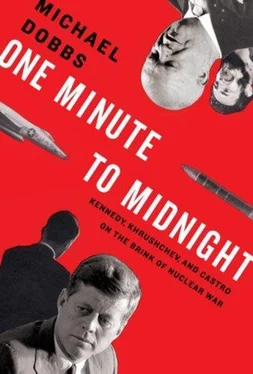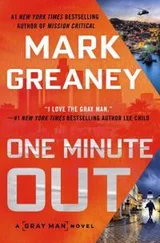“They might give orders to blow it up or something,” his brother interjected.
“It’s this baby food thing that worries me,” fretted Robert McNamara.
An even bigger worry was Soviet submarines, reported to be tracking at least two of the missile-carrying ships. An aircraft carrier, the USS Enterprise, was in the vicinity. Kennedy wondered if that was wise. “We don’t want to lose a carrier right away.”
After signing the proclamation, Jack met with Bobby in the Cabinet Room. With no advisers around, the two brothers were much more open about revealing their true thoughts. The president was irritated with his wife for organizing a formal dinner party that evening with the Maharaja of Jaipur, an unwanted distraction from the coming showdown with Khrushchev. For a brief moment, it seemed as if he might be having second thoughts, but he pushed them aside.
“It looks like it’s going to be real mean, doesn’t it?” he told his brother. “But on the other hand, there’s really no choice. If they get this mean on this one—Jesus Christ! What are they going to fuck up next?”
“No, there wasn’t any choice,” Bobby agreed. “I mean you woulda… you woulda been impeached. ”
“Well, that’s what I think. I woulda been impeached.”
Four blocks away from the White House, Soviet diplomats were hosting a caviar and vodka reception in their embassy, a farewell party for a departing naval attache. Guests crowded around anyone in a military uniform, demanding Moscow’s reaction to the blockade. “I fought in three wars already and I am looking forward to fighting in the next,” blustered the military attache, Lieutenant General Vladimir Dubovik, wiping his perspiring hands with a handkerchief. “Our ships will sail through.”
“He’s a military man; I’m not,” shrugged Ambassador Dobrynin, when asked about Dubovik’s comment. “He is the one who knows what the Navy is going to do.”
Other Soviet officials displayed less bravado. At the mission to the United Nations in New York, diplomats exchanged dark jokes about the epitaph on their tombstones in the event of nuclear war.
“Here lie the Soviet diplomats,” was one suggestion. “Killed by their own bombs.”
8:15 P.M. TUESDAY, OCTOBER 23
Trailed by military and civilian aides, Robert McNamara walked out of his third-floor suite of offices on the E-Ring, the Pentagon’s power corridor, overlooking the Potomac River. He was headed for the nerve center of the quarantine operation, Navy Flag Plot, located in the adjacent wing of the complex, one floor up. The president had instructed him to keep a close watch on the Navy’s plans for enforcing the blockade.
At the age of forty-six, McNamara was the epitome of “the best and the brightest” minds that JFK had promised to bring to Washington after his election victory. With his metal spectacles and closely cropped, slicked-back hair, he looked and sounded like a human version of the computers that were beginning to transform American industry. His brain seemed to worked faster than anyone else’s. He had a knack for quickly honing in on a complex problem and reducing it to an elegant mathematical formula. But he also had a more sensitive, soulful side that appealed to women. “Why is it,” Bobby Kennedy once asked, “that they call him the ‘computer’ and yet he’s the one all my sisters want to sit next to at dinner?”
While conceding that the secretary was brilliant, the uniformed military also found him arrogant and interfering. Many senior officers disliked him intensely. They were suspicious of his entourage of precocious young civilians, known as the “whiz kids,” who appeared intent on shaking up the military. In private, they accused McNamara of circumventing the regular chain of command. They hated his habit of reaching down into the inner workings of the Pentagon like no other secretary of defense before him, challenging their figures, nixing their favorite weapon systems, and questioning the traditional way of running things.
For his part, McNamara was concerned that he wasn’t getting accurate and timely information from the Navy. Neither he nor his deputy, Roswell Gilpatric, were seeing the messages that were going out to the fleet from CINCLANT, commander in chief Atlantic, in Norfolk, Virginia. They worried that a small incident—such as an argument between a Russian and an American sailor—could snowball into a nuclear war. In the atomic age, it was no longer enough for the president to “command” the armed forces. He also had to be able to exercise day-by-day, sometimes minute-by-minute, “control.”
Entering Navy Plot, the defense secretary and his aides confronted a huge wall map of the Atlantic, charting the locations of American and Soviet ships. Armed Marines guarded the door. Enlisted men were using long handles to push markers around the map to reflect the latest intelligence. Flags representing American aircraft carriers and destroyers were forming up along an arc, five hundred nautical miles from the eastern tip of Cuba, stretching from Puerto Rico toward the coast of Florida. Nearly two dozen arrows denoting Soviet ships were pointed across the Atlantic toward Cuba.
In his brusque, no-nonsense fashion, McNamara began firing questions to the admiral on duty, similar to the ones JFK had been agonizing over all day at the White House. How does a U.S. warship signal a Soviet vessel to halt? Are there Russian interpreters on board? What if they refuse to reply to our signals? How do we respond if they open fire? Why are these warships out of position?
The duty admiral was either reluctant, or unable, to respond to the barrage of questions. This sort of interrogation went beyond the bounds of Navy tradition. As a naval officer who witnessed the scene later explained, “In the Navy, the ethos is, you tell someone to do something, not how to do it.” McNamara was telling the Navy how to do its job.
Dissatisfied with the answers he was getting, McNamara asked to see the chief of naval operations, Admiral George Anderson. Known variously in the Navy as 00, CNO, and “Gorgeous George,” the tall, handsome naval officer was a firm believer in the naval creed of choosing the right subordinates and letting them get on with it. His personal philosophy, he informed visitors to his E-Ring office, consisted of a few simple maxims. “Keep a firm grasp of fundamentals. Leave details to the staff. Go for morale, which is of transcending importance. Don’t bellyache and don’t worry.” After signing off on the blockade regulations, he had sent a memo to McNamara that read, “From now on, I do not intend to interfere with…the Admirals on the scene unless we get some additional intelligence information.”
Anderson had accepted the job of planning a naval blockade of Cuba under protest. He informed McNamara that the assignment was tantamount to “locking the barn door after the horse has already been stolen.” Nuclear missiles were already on the island, so a blockade would not accomplish the objective of getting them out, and would mean a confrontation with the Soviet Union rather than Cuba. A better option, he thought, was to bomb the missile sites. Nevertheless, he would carry out his orders.
The admiral resented McNamara’s meddling in operational matters. He was also determined to protect one of the Navy’s most closely guarded secrets: its ability to locate Soviet submarines through a sophisticated network of radio detection receivers. The U.S. warships that McNamara had raised questions about were tracking the Soviet Foxtrots. Though the secretary and deputy secretary were obviously cleared for the secret information, several of the civilian aides who had accompanied them to Navy Plot were not. In order to explain what was happening with the submarines, Anderson steered McNamara and Gilpatric to a smaller room next door known as Intelligence Plot.
Читать дальше












